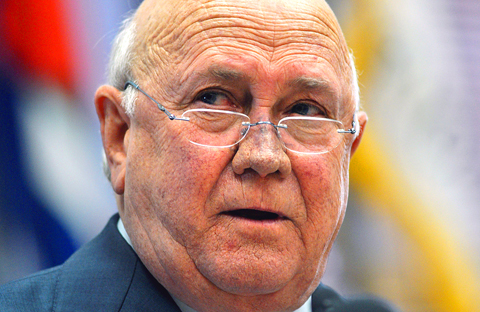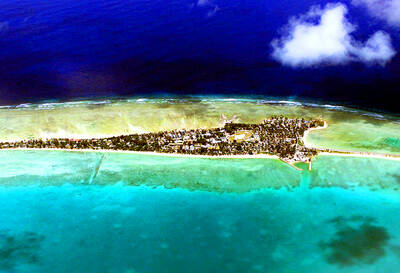Twenty years after announcing Nelson Mandela? release from prison, South Africa? last white president said on Tuesday that dismantling apartheid had averted catastrophe.
?he nine days between [his speech to parliament] and the release of Nelson Mandela on 11 February changed South Africa forever,?former South African president FW de Klerk told a conference commemorating the 20th anniversary of the announcement.
?t is accordingly appropriate for us to celebrate the 20th anniversary of Feb. 2, 1990 ?not to honor my role or the role of any other individual or party, but because it prevented a catastrophe,?he said.

PHOTO: AFP
De Klerk had been in office less than five months when he delivered the historic address to parliament, which called for a new democratic constitution, lifted the ban on dissident political parties and announced the release of all political prisoners, including his eventual successor as president, Mandela.
A one-time hardliner in the pro-apartheid National Party, De Klerk would go down in South African history as the last president of the white supremacist regime, which ended when Mandela? African National Congress party won multi-racial elections in 1994.
?e would, no doubt, have been able to maintain control for many years but under increasingly grim and unacceptable circumstances,?De Klerk said.
?ur young men would have spent half their time in military service; many more white South Africans would have left the country; and there would have been pervasive white poverty and 赴nemployment among those who remained,?he said.
?orse still, the prospects for a satisfactory negotiated settlement would have diminished with each successive cycle of revolution and repression,?he said.
Mandela? release nine days after De Klerk? address ended his 27-year imprisonment.
The two shared the Nobel Peace Prize in 1993 for their work in ending the apartheid regime and building a new democratic South Africa.
? critically important factor was the acceptance by all sides that there could be neither a military nor a revolutionary victory ?and that continuing conflict would simply turn South African into a wasteland,?De Klerk said.
Twenty years ago, De Klerk? speech was not an obvious political move.
?t was a brave move. A very brave move in the face of potential disaster,?said Paul Graham, executive director of the Institute for Democracy in Southern Africa.
But some South Africans remember De Klerk less for his idealism than for his pragmatic attempt to save the country from disaster.
At the time, South Africa? divisive political system had brought the nation to the brink of civil war.
The economy was collapsing under the weight of international sanctions and the country was ? steadily deteriorating pariah?internationally, Graham said.
?W deserves recognition not for any great desire to right the wrongs of the past, but for his pragmatism,?an editorial in the Star newspaper said on Tuesday.
?W is not and never will be everyone? hero, but February 2, 1990, should be remembered as the day he had the bravery to do the right thing.?br />
With the speech, De Klerk, now 73, set in motion the country? transformation into a multiracial democracy.

DISASTER: The Bangladesh Meteorological Department recorded a magnitude 5.7 and tremors reached as far as Kolkata, India, more than 300km away from the epicenter A powerful earthquake struck Bangladesh yesterday outside the crowded capital, Dhaka, killing at least five people and injuring about a hundred, the government said. The magnitude 5.5 quake struck at 10:38am near Narsingdi, Bangladesh, about 33km from Dhaka, the US Geological Survey (USGS) said. The earthquake sparked fear and chaos with many in the Muslim-majority nation of 170 million people at home on their day off. AFP reporters in Dhaka said they saw people weeping in the streets while others appeared shocked. Bangladesh Interim Leader Muhammad Yunus expressed his “deep shock and sorrow over the news of casualties in various districts.” At least five people,

ON THE LAM: The Brazilian Supreme Court said that the former president tried to burn his ankle monitor off as part of an attempt to orchestrate his escape from Brazil Former Brazilian president Jair Bolsonaro — under house arrest while he appeals a conviction for a foiled coup attempt — was taken into custody on Saturday after the Brazilian Supreme Court deemed him a high flight risk. The court said the far-right firebrand — who was sentenced to 27 years in prison over a scheme to stop Brazilian President Luiz Inacio Lula da Silva from taking office after the 2022 elections — had attempted to disable his ankle monitor to flee. Supreme Court judge Alexandre de Moraes said Bolsonaro’s detention was a preventive measure as final appeals play out. In a video made

It is one of the world’s most famous unsolved codes whose answer could sell for a fortune — but two US friends say they have already found the secret hidden by Kryptos. The S-shaped copper sculpture has baffled cryptography enthusiasts since its 1990 installation on the grounds of the CIA headquarters in Virginia, with three of its four messages deciphered so far. Yet K4, the final passage, has kept codebreakers scratching their heads. Sculptor Jim Sanborn, 80, has been so overwhelmed by guesses that he started charging US$50 for each response. Sanborn in August announced he would auction the 97-character solution to K4

SHOW OF FORCE: The US has held nine multilateral drills near Guam in the past four months, which Australia said was important to deter coercion in the region Five Chinese research vessels, including ships used for space and missile tracking and underwater mapping, were active in the northwest Pacific last month, as the US stepped up military exercises, data compiled by a Guam-based group shows. Rapid militarization in the northern Pacific gets insufficient attention, the Pacific Center for Island Security said, adding that it makes island populations a potential target in any great-power conflict. “If you look at the number of US and bilateral and multilateral exercises, there is a lot of activity,” Leland Bettis, the director of the group that seeks to flag regional security risks, said in an